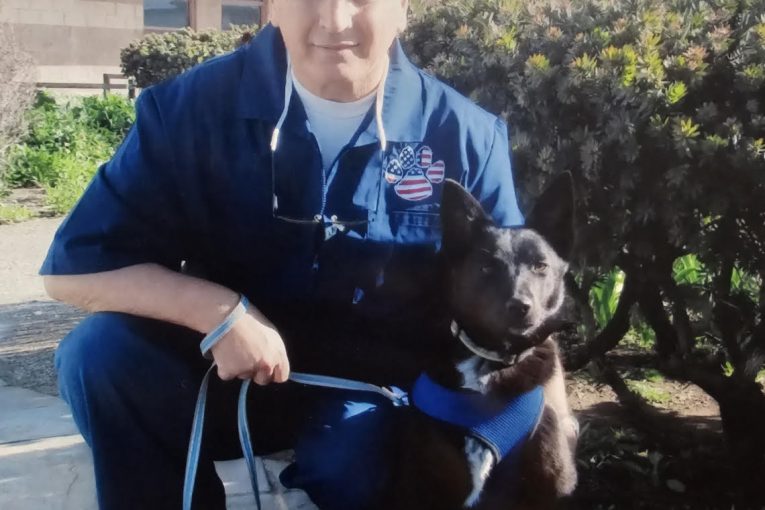

By Ghostwrite Mike & The Mundo Press
CHOWCHILLA, CA – It’s Sunday morning in Valley State Prison’s (VSP) C Yard Honor Building, where dual NFL games are blaring from two 60-inch flat screen TVs on opposite ends of the dayroom. Guys are playing pool and Logan, a 10-month old Boxer mix, is working on the “heel” command with Oleg, his secondary handler.
Flat screens, pool tables and puppies are welcome in the California model of corrections.
Oleg Tarasuk immigrated to America from Russia after escaping an abusive household that normalized violence shortly after his alcoholic father was murdered by another relative. When he arrived in Sacramento, Oleg brought with him a traumatized childhood and a drinking habit developed in the shadow of his father.
After marrying a concert violinist, starting a family and working as a warehouse manager, the casual drinking had become an anvil. First came the DUI with probation and a house party that began in high spirits among friends ended with a neighbor’s face destroyed. Oleg was in jail for a second alcohol-related incident, this time involving real violence in the home.
William Shultz, Logan’s primary handler, is half Oleg’s age, but an experienced dog trainer who transferred to VSP from another canine service dog program in order to take advantage of VSP’s youth-oriented programming.
Shultz said, “Oleg is really great with animals. Though he speaks with a noticeable accent and uses broken English, his command acumen is on point and his reward discipline (balance) is effective. Logan’s exceptional progress is due to Oleg’s combination of rare patience, age, and work ethic—he works harder with these dogs than most of the primary handlers.”
Oleg is a quiet, but emotional man, quick to smile, slow to anger, and sober—for a decade now. He tells us he feels all of the pain and regret that he used to bury with the escapism of numbing alcohol.
“I am becoming old man,” he says as we walk the big yard and sit at the benches near the gym. “I could take the psych pill to feel nothing, but I don’t do it. I feel so sorry for my life mistakes. I ruin my home and family life, yes, but most terrible, I destroy another family completely with my worst mistake.”
“I am alive, but the man I take away driving drunk, he never come back. His family destroy. I take him. I need to feel all.” His bottom lip quivers, his eyes fill with tears, and Logan whimpers in an eerie acknowledgement of something being wrong. The regret is obvious, but the remorse is endearing, visceral, and sadly unknowable to most—nobody ever asks Oleg about any of it.
Oleg voluntarily attends Alcoholics Anonymous, Celebrate Recovery and Domestic Violence classes, because, as he says, “I owe debt. I never learn before. Now I try to learn.” He attends worship services, attends classes to improve his English proficiency, and donates his crochet creations to art drives, charities, and to the dogs in the Freedom K-9 program to wear in cold weather.
“I have so much time now, I never get out. I die here. But my life I give it to the animals, my wife, and the people. I try to make, no take.”
When we asked Oleg how he might serve the larger community beyond the fence line if he could, he said immediately “tell the people not to drink, not to drive, and to not hurt people. I speak Russian, but maybe they use the letters to tell the people what I say?”
Oleg knows nothing about the MADD organization, or how his testimony might be a useful interventionist tool to deploy with probationers. His three increasingly harmful encounters with law enforcement revolving around alcohol that got progressively worse are teachable moments.
Within the crime universe in which one can be sentenced to an indeterminate life term, one notices there are very few that can objectively be deemed accidental, or something less than intentional.
Granted, while drinking is a scourge of gross negligence that causes volatile chaos, nobody can reasonably saddle Oleg with having set out to murder another person. There is a serious distinction in culpability here, which we believe the system needs to address with greater sentencing equity.
Oleg tells me he only knows what he did because of how the court process showed him the consequences of his actions. “I never remember driving. I only know what I do when they read to me what I do. I leave police. They chase me. I drive over sidewalk. I kill husband. His wife watch him die. I hit another family car. His shoe I see.”
He doesn’t use his intoxication as an excuse to own his culpability; in fact, he reads his police reports, draws recreations of what the scene might have looked like and writes about those images so he can stay in touch with the survivor’s trauma. He brings those recreations to group and discusses it all openly.
Having spent the whole day with him, Oleg asks us “why you guys talk to me about this?” We tell him, “Because everybody should be talking about this. We all need to be talking, and society needs to be listening.” As we part ways, Oleg tells Logan to “visit.” He runs to us, leans into my leg, discovers we have no kibble to give, and returns to Oleg’s side obediently.
He says to us, “You know, I wish one day I talk to my victim family. I know they hate me. I take all blame. But I wish I could say how sorry to them. Face to the face. I wish nobody drink. I wish I learn to not drink. Everybody need to know.”
